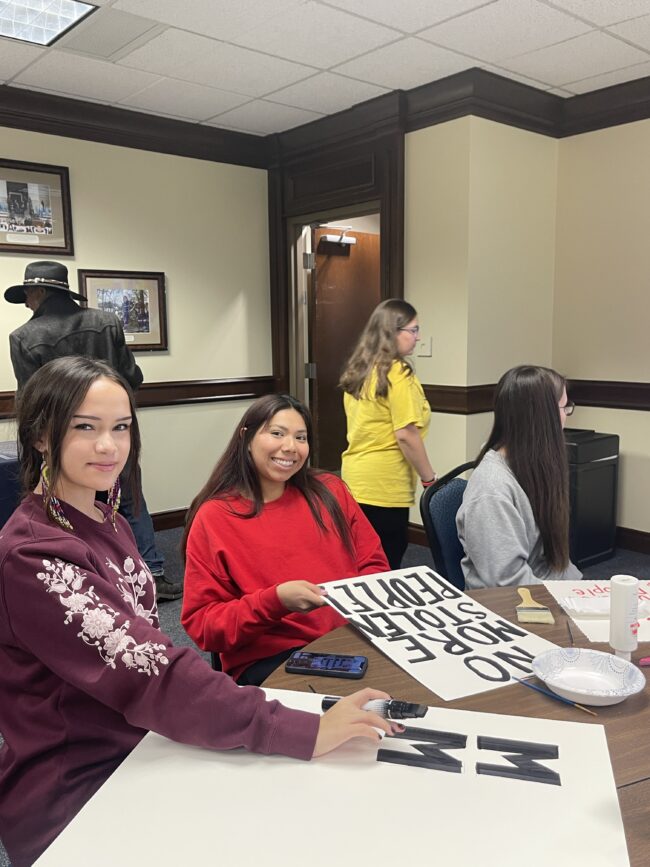NASA Hosts MMIP Awareness Event at UCO

The University of Central Oklahoma’s Native American Student Association (NASA) hosted a Missing and Murdered Indigenous Peoples (MMIP) poster-making and education event on Thursday in the Nigh University Center to raise awareness about the MMIP crisis and educate students.
“It’s a topic that no one really talks about, especially in Oklahoma,” said Riley McClain, president of NASA.
“We have a lot of missing and murdered Indigenous people, and since it’s Native American Heritage Month, we thought it would be the perfect time to shed light and educate others that Native people are still here, still thriving, and still being murdered.”
NASA’s event combined art and activism by inviting students to create posters for an upcoming MMIP protest march while learning about the systemic issues behind the crisis. “Education comes first,” McClain said.
“When we planned our November events, we wanted something that balanced education and advocacy. The idea of a poster-making and MMIP education session came naturally.”
The term MMIP stands for “Missing and Murdered Indigenous Peoples,” and refers to the alarming number of Indigenous people, particularly women and girls, who have gone missing or been murdered, often with little public knowledge or justice.
According to the US Department of Justice, Native American and Alaska Native women are murdered at rates more than ten times higher than the national average in some places. Oklahoma is one of the top states for MMIP cases, according to the Urban Indian Health Institute.
“It’s an important issue because we have one of the highest Native populations, and it’s still not recognized,” McClain said.
“Law enforcement doesn’t always take these cases seriously. Sometimes reports get ignored, or cases go cold, and that’s why we want to bring more recognition to those who are missing.”
McClain added that overlapping powers between tribal and state law enforcement agencies slow MMIP investigations.
“Oklahoma has a lot of reservations and treaties between tribal and state law enforcement,” she said. “We hope that cooperation between agencies becomes more common so these cases don’t get overlooked.”
She highlighted that raising awareness among college students might have a broad impact. “We want college students to learn about MMIP so they can go home and tell their families,” said McClain.
“Then their families can share it, and people become more comfortable discussing it. “That is how awareness spreads.”
At UCO, MMIP is also being studied in the classroom. The institution currently offers an Indigenous Studies minor, and the Cold Case Club investigates unsolved MMIP-related cases.
“It’s great to see more classes and clubs bringing attention to these issues,” McClain said.
McClain sees it as deeply personal. “I didn’t grow up in my Native world, so I’ve been learning as I go,” she said.
“When I joined NASA and heard about MMIP, it didn’t sit well with me. It must be a natural chat, not anything restricted.”
She recalled one case that left a strong impression on her: the Oklahoma City Butcher murders, in which three Indigenous women were brutally killed and misidentified.
“It was heartbreaking to see how they were misrepresented,” McClain said. “That’s what happens in so many MMIP cases in Oklahoma, and that’s why we’re here, trying to bring it to light.”
Through education and open dialogue, McClain and NASA hope the event will encourage more students to recognize the ongoing crisis and join Indigenous people in pursuing justice.

